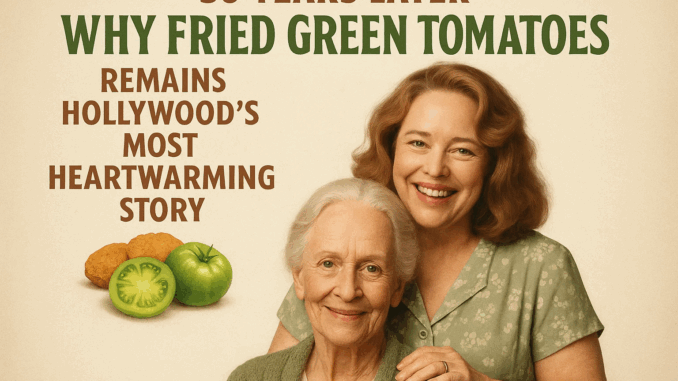
Movies come and go, but very few leave a mark that lasts decades. Fried Green Tomatoes (1991) isn’t just a film—it’s an experience that blends friendship, courage, and resilience into one unforgettable story. Based on Fannie Flagg’s novel Fried Green Tomatoes at the Whistle Stop Café, the film continues to resonate with audiences worldwide. It’s more than Southern charm and comfort food—it’s about human connection, empowerment, and finding strength even in the darkest times.
Let’s dive into why Fried Green Tomatoes is still celebrated as a timeless classic.
H1: The Story Behind Fried Green Tomatoes
At its heart, Fried Green Tomatoes tells two interwoven stories. The first is about Evelyn Couch, a housewife seeking purpose in her life, who befriends Ninny Threadgoode, a lively elderly woman. Through Ninny’s storytelling, Evelyn learns about the past—the lives of Idgie Threadgoode and Ruth Jamison, two women whose bond defied social norms in the 1920s and 1930s South.
This dual narrative bridges generations, making it relatable to viewers across different ages and backgrounds.
H2: A Tale of Two Friendships
The film beautifully juxtaposes two friendships:
-
Evelyn and Ninny in the present
-
Idgie and Ruth in the past
These relationships show how friendship can heal wounds, inspire courage, and bring out hidden strength.
H2: Why Friendship Is at the Core
Have you ever had a friend who made you braver just by being around? That’s what Idgie and Ruth were to each other. Their loyalty and care weren’t just about companionship—it was about survival, love, and resilience in the face of societal judgment.
H2: Women Defying Expectations
Back in the 1920s South, women were expected to stay quiet, obedient, and dependent. Idgie Threadgoode wasn’t having it. She wore trousers, ran her own life, and refused to let anyone tell her how to behave. Ruth, gentle yet strong, complemented Idgie’s fire. Together, they challenged traditional gender roles, showing women could be bold, independent, and fearless.
H2: The Whistle Stop Café – More Than Just Food
Yes, the fried green tomatoes at the Whistle Stop Café look delicious, but the café itself represents so much more. It’s a safe haven where people—regardless of class, race, or gender—could find community and acceptance.
Think of it as the heart of the story: warm, inviting, and filled with the kind of comfort food that nourishes more than the body.
H2: Themes of Courage and Resilience
The film isn’t just sweet nostalgia—it tackles serious issues:
-
Domestic abuse
-
Racism in the Deep South
-
Loss and grief
-
Self-discovery
Yet, it handles them with grace, showing that even in hardship, people can find the courage to stand tall and push forward.
H2: The Role of Storytelling
What’s fascinating about Fried Green Tomatoes is that it’s essentially a story within a story. Ninny’s tales breathe life into the past, and through them, Evelyn transforms her present. It’s proof of how powerful storytelling can be—it doesn’t just entertain, it heals, inspires, and shapes us.
H2: Representation and Subtext
For years, viewers have debated the nature of Idgie and Ruth’s relationship. Was it friendship? Was it love? The film leaves space for interpretation, but one thing is certain: their bond was profound and life-changing. This subtle representation of LGBTQ+ themes in early ’90s cinema was groundbreaking in its own right.
H2: Performances That Brought the Story to Life
Casting played a huge role in why the film remains unforgettable:
-
Kathy Bates as Evelyn—bringing vulnerability and transformation to the screen.
-
Jessica Tandy as Ninny—charming, wise, and full of spirit.
-
Mary Stuart Masterson as Idgie—fiery, bold, and fearless.
-
Mary-Louise Parker as Ruth—gentle yet resilient, with quiet strength.
Each actor made their character feel real, relatable, and deeply human.
H2: Symbolism of Food and Community
Food isn’t just food in this film—it’s a symbol of love, connection, and survival. Sharing fried green tomatoes at the café wasn’t just about eating—it was about belonging. Food became a metaphor for comfort and togetherness.
H2: Lessons We Can Still Learn Today
Why does this film matter three decades later? Because its lessons are timeless:
-
Friendship can change lives
-
Courage isn’t the absence of fear—it’s action despite fear
-
Resilience comes from love and community
-
Your story can inspire others
H2: Cultural Impact and Legacy
Fried Green Tomatoes was more than just a hit film—it became a cultural touchstone. It sparked conversations about women’s empowerment, LGBTQ+ representation, and Southern storytelling. It also left us craving actual fried green tomatoes!
H2: Behind the Scenes Trivia
Did you know?
-
The café from the movie still exists in Juliette, Georgia, and fans visit it to this day.
-
Kathy Bates’ famous “Towanda!” scene was inspired by real women reclaiming their power.
-
Fannie Flagg, the author of the novel, co-wrote the screenplay.
H2: Why It Still Resonates With Audiences
In a world that often feels divided, Fried Green Tomatoes reminds us of the power of kindness, friendship, and human connection. Its themes are universal, and that’s why new generations continue to discover and fall in love with it.
H2: A Timeless Celebration
When we look back at films that stand the test of time, Fried Green Tomatoes shines bright. It’s not just about Southern charm—it’s about people finding themselves, lifting each other up, and facing life with courage.
Conclusion
Fried Green Tomatoes (1991) is more than a film—it’s a heartfelt reminder that friendship, courage, and resilience never go out of style. With its rich characters, deep themes, and unforgettable storytelling, it continues to inspire audiences worldwide. Whether you’ve seen it once or a hundred times, the film always leaves you with warmth in your heart and maybe a craving for something fried.
